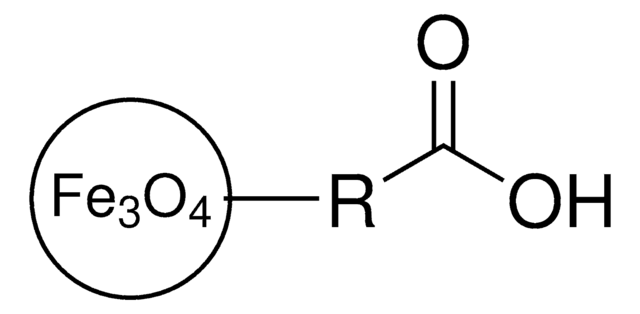700312
Iron oxide(II,III), magnetic nanoparticles solution
10 nm avg. part. size, 5 mg/mL in toluene
Synonym(s):
Magnetic iron oxide nanocrystals, Magnetite, Superparamagnetic iron oxide nanoparticles
About This Item
form
nanoparticles
solution
concentration
5 mg/mL in toluene
magnetization
>45 emu/g (at ambient temperature under 4500 Oe)
avg. part. size
10 nm
particle size
9-11 nm (TEM; conforms)
density
0.865 g/mL at 25 °C
SMILES string
O=[Fe].O=[Fe]O[Fe]=O
InChI
1S/3Fe.4O
InChI key
SZVJSHCCFOBDDC-UHFFFAOYSA-N
Looking for similar products? Visit Product Comparison Guide
General description
It contains <1.0% oleic acid stabilizing ligands.
Application
Signal Word
Danger
Hazard Statements
Precautionary Statements
Hazard Classifications
Aquatic Chronic 3 - Asp. Tox. 1 - Flam. Liq. 2 - Repr. 2 - Skin Irrit. 2 - STOT RE 2 - STOT SE 3
Target Organs
Central nervous system
Storage Class Code
3 - Flammable liquids
WGK
WGK 3
Flash Point(F)
45.0 °F
Flash Point(C)
7.2 °C
Personal Protective Equipment
Certificates of Analysis (COA)
Search for Certificates of Analysis (COA) by entering the products Lot/Batch Number. Lot and Batch Numbers can be found on a product’s label following the words ‘Lot’ or ‘Batch’.
Already Own This Product?
Find documentation for the products that you have recently purchased in the Document Library.
Customers Also Viewed
Articles
A key challenge for nanomaterial safety assessment is the ability to handle the large number of newly engineered nanomaterials (ENMs), including developing cost-effective methods that can be used for hazard screening.
Graphene is a unique two-dimensional (2D) structure of monolayer carbon atoms packed into a dense honeycomb crystal that has attracted great interest due to its diverse and fascinating properties.
Professor Hui Mao explores the use of superparamagnetic iron oxide nanoparticles (INOPs) that offer an alternate contrast-enhancing mechanism.
Professor Yadong Yin (University of California Riverside, USA) examines both direct (thermal decomposition, solvothermal, hydrothermal) and indirect (templated) synthesis methods of magnetite nanocrystals and reviews in detail the landscape of these various synthetic methods for magnetite nanocrystal and their applications in magnetic assembly, magnetic hyperthermia, and Li-Ion batteries.
Our team of scientists has experience in all areas of research including Life Science, Material Science, Chemical Synthesis, Chromatography, Analytical and many others.
Contact Technical Service



